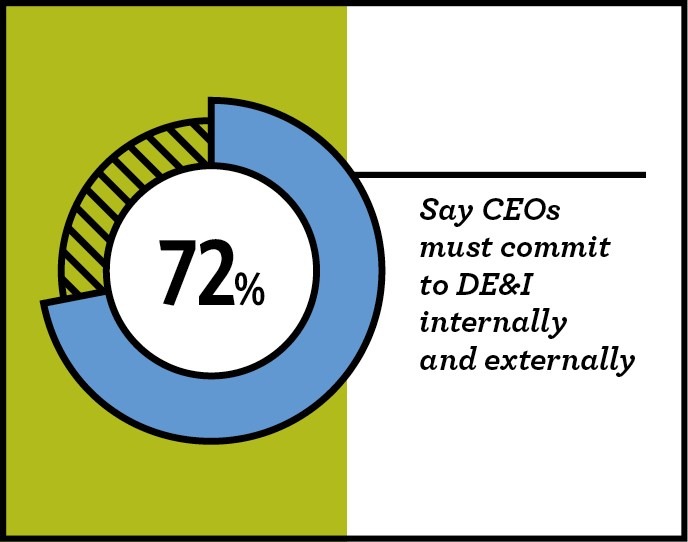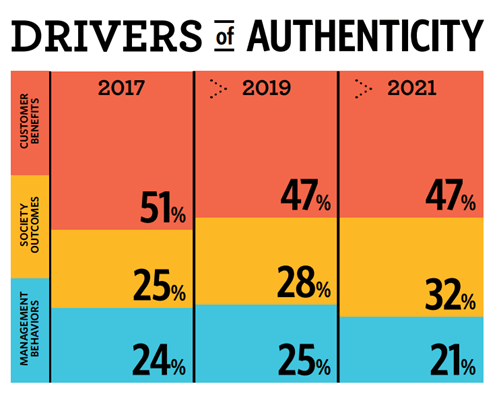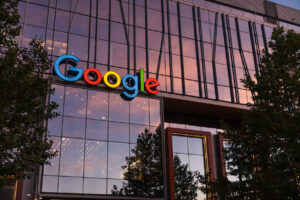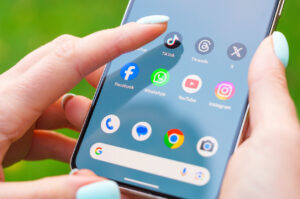Facebook offers more WFH flexibility, consumers want brands to show social impact, and JBS defends paying $11M ransom
Also: The need to bolster employer brand, BlackRock’s viral Twitter moment, Carnival crosses horns with Texas’ governor, PR pros language pet peeves, and more.
Hello, communicators:
According to the Labor Department, 4 million people quit their jobs in April, a sign that more workers are optimistic about their job prospects.
The news also comes amid reports that businesses are struggling to fill open roles with millions of job openings unfilled despite an unemployment rate that hasn’t bounced back to pre-COVID levels. Many employers are offering higher wages, new benefits and other enticements to get more applicants for their openings.
”Job seekers have a strong hand in the labor market,” says Nick Bunker, an economist with the jobs site Indeed. Across the country, employers are staffing up to prepare for renewed summer activity as vaccination rates increase and Covid-19 case rates go down.
It’s a reminder to redouble your efforts to build your employer brand by spotlighting employees, showcasing company culture and establishing industry leadership across all your communications channels. For internal communicators in particular, the labor crunch offers a unique opportunity to demonstrate value to top leaders and get a bigger budget for important storytelling efforts.
Here are today’s top stories:
Facebook’s Zuckerberg announces more WFH flexibility in memo
The social media giant is going to offer more flexibility for workers who want to keep working remotely according to a memo reported in The Wall Street Journal.
“I’ve found that working remotely has given me more space for long-term thinking and helped me spend more time with my family, which has made me happier and more productive at work,” Zuckerberg wrote, according to the Journal.
The company will allow employees across all levels to apply for remote work if their role permits. Employees who want to come back to the office will be allowed to keep flexibility, but will be encouraged to spend at least half their year in the workplace.
What you should know:
Zuckerberg has humanized the decision around remote work for Facebook by opening up about his personal experience working from home during the last year. By positioning the policy in terms of benefits that he also enjoys, he demonstrates empathy for workers and creates an image of a unified workforce across all levels of the organization, as opposed to a stratified structure where workers lack perks enjoyed by top leaders.
MEASURED THOUGHTS
In a new report from FleishmanHillard, 73% of consumers say they expect CEOs to take a stand on diversity, equity and inclusion both internally and externally.

The report shows that a company’s impact on the community and society at-large is a growing driver of how consumers perceive authenticity. It’s not enough to offer value to customers—you must also show ethical behavior and a greater commitment to things like the environment, social justice and more.

You can read the full report here.
Concern for stakeholders is reason companies say they pay ransomware bounties
As cyberattacks force organizations to make tough decisions, many in recent months have made the decision to pay the ransom to criminal gangs that have hijacked their computer systems. When asked about the expenditure of millions in Bitcoin, leaders again and again cite concerns for stakeholders, from consumers to employees and partners, as reasons to pay up.
The world’s largest meat supplier JBS paid $11 million in ransom over a recent cyberattack that mirrored Colonial Pipeline’s attack where execs also paid millions to recover computer access.
Payment was made as an attempt to cushion the impact the attack placed on business procedures and JBS partners, including restaurants, grocery stores and farmers, according to Andre Nogueira, CEO of JBS SA’s U.S. division.
“It was very painful to pay the criminals, but we did the right thing for our customers,” said Nogueira. The company head also admitted the ransom was paid after most of the JBS plants were functioning and operational.
Why it matters:
In crafting your crisis communications plan for cyberattack threats, remember that a crisis will have an impact on more than just your organization. Be sure to highlight how your organization is taking care of partners, customers and others who are relying on you to provide essential services.
If you do decide to pay a ransom, know that there will be questions about your decision—and being able to show how you put others ahead of your own interests might be your only defense.
SOCIAL BUZZ
Investment giant BlackRock was trending on Twitter over reports about how it is snapping up American homes, helping to drive up prices in locations across the country. However, the thread that got the conversation started deserved a closer look:
Thread.
Blackrock is buying every single family house they can find, paying 20-50% above asking price and outbidding normal home buyers. Why are corporations, pension funds and property investment groups buying…https://t.co/uTagTOQQgI
— CulturalHusbandry (@APhilosophae) June 9, 2021
Twitter users noted that the thread goes from bashing BlackRock’s investment strategy to embracing conspiracy theories including the “big lie” that the 2020 election was stolen from former-president Donald Trump.
Quick heads-up for folks sharing that thread about the home buyers market. Rather then sharing, do a quick fact check and write a new tweet from a more reliable source. If you follow the thread to the end it devolves into supporting The Great Lie and COVID denial. pic.twitter.com/jTNetHMTwG
— Erin Biba (@erinbiba) June 9, 2021
It’s a reminder to double-check posts on social media before sharing them, with a sobering takeaway for crisis communicators and brand managers: Anyone can start a fire on social media that can drag your brand through the mud. Even if you have lots of brand messaging supporting all the “right” social causes, if your business practices are hurting consumers, your message rings hollow:
Look I get that BlackRock is a pernicious, parasitic investment fund that’s buying up all the houses in your neighborhood and contributing to the American debtors hellscape.
But they support Pride, so what can you do? pic.twitter.com/bv7P8cglI2
— Pete D’Abrosca (@pdabrosca) June 10, 2021
RAGAN’S 2021 BENCHMARK REPORT
Ragan has released its annual Communications Benchmark Report, an exclusive study from Ragan’s Communications Leadership Council that analyzes the major trends in the profession over the last year.
During that time, comms pros have been called on to develop and distribute messages on new policies that affect internal and external stakeholders alike. Their role has become more essential as they helped keep their organizations focused and moving forward. They’ve seen their access to the C-suite increase throughout 2020, and they forged important new alliances with peers in other departments, including HR, finance and workplace wellness.
Culled from more than 750 respondents, the 32-page report is available in its entirety exclusively to members of the Communications Leadership Council.
Download your copy of the exclusive Benchmark Survey Executive Summary today and get a crucial competitive advantage that will fuel your success for 2021 and beyond.
Carnival clashes with Teas Gov. Greg Abbott over vaccine requirements
The state of Texas, along with Florida, has prohibited businesses from using vaccine passports or requiring guests to prove their vaccination status before using their services. The move contradicts federal guidance from the CDC which recommends unvaccinated patrons continue to follow social distancing measures—an effort that is increasingly difficult to enforce as vaccinated consumers look to return to pre-pandemic activities.
“The current CDC requirements for cruising with a guest base that is unvaccinated will make it very difficult to deliver the experience our guests expect, especially given the large number of families with younger children who sail with us,” Carnival Cruise Line president Christine Duffy, said. “As a result, our alternative is to operate our ships from the U.S. during the month of July with vaccinated guests.”
What you should know:
Carnival’s message about vaccine requirements is positioned around being able to offer value to passengers. Rather than focus on a debate over privacy, consumer rights and public health rules, the cruise line is instead focusing on its core product: the experience on its ships.
When looking to make the case for vaccine requirements, be sure to tie your decision back to your unique value proposition or your brand purpose.
COMMUNICATIONS WEEK
Ragan is delighted to add industry event and thought leadership brand Communications Week to our portfolio. You can read the full press release here.
“We are reimagining Communications Week as a year-round endeavor,” says Ragan Communications CEO Diane Schwartz. “The rollout will begin next month with thought-provoking content on the future of communications on Commsweek.com, Ragan.com and PRDaily.com, culminating with a weeklong series in November that will feature conferences, networking events, workshops, webinars and more.”
The flagship event for 2021 will take place Nov. 15-19. Stay tuned for updates on the many opportunities and offerings that will help communicators connect, learn and celebrate their achievements later this year.
WHAT YOU SAID
We asked for some of your top language and grammar pet peeves … and illogical constructions were the top of many lists:
First annual
— Matt DePoint (@mattdepoint) June 9, 2021
Some are timely gaffes:
Global pandemic
— Kent Kaiser, PhD APR (@kentkaiser) June 10, 2021
Others added theirs:
Incorrect use of "myself" – "Myself, Joe and Sally are going to speak at the conference."
— Michelle Allard McMahon (@mallardmcmahon) June 9, 2021
https://twitter.com/MLMPRNYC/status/1402836514996953089
SOUNDING BOARD
Are you investing in your employer brand (recruitment and retention) even more for the rest of 2021? How are your comms responding to the changing labor market?
Are you making your employer branding (recruitment and retention) a bigger emphasis for the rest of 2021? Share your thoughts for our #DailyScoop!
— PR Daily (@PRDaily) June 10, 2021
Tell us your thoughts in the comments or tweet @PRDaily with our hashtag #DailyScoop!







